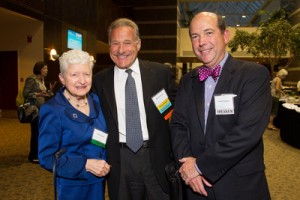Related Posts

Gladys Siegel, Michael Kafrissen, MD and Joe Coughlin, PhD, 2012 Foard Lecture, Tom Fuldner Photography
I’ve heard from several people who were really energized by Joe Coughlin’s Foard Lecture sponsored by our School. They wondered why we don’t have more courses about aging or a formal aging program in the School. (By the way, it’s not just our school of public health; it’s most schools.) A number of faculty members study problems of aging, such as cardiovascular disease and cancer. We also have faculty members, like Jon Oberlander, PhD, professor of health policy and management, who specialize in Medicare. Peggye Dilworth-Anderson, PhD, professor of health policy and management, is an authority on dementia and caregiving. She and Mary Palmer, PhD, Helen W. and Thomas L. Umphlet Distinguished Professor in Aging, School of Nursing, are interim co-directors of UNC’s Institute on Aging. But we don’t have an integrated program across departments with a focus on aging, as we do for global health and health disparities. To date, there hasn’t been an integrated academic program or identity. A recent alumna asked why.
Here’s part of what I said.
- There used to be money for students in aging training programs. Now, there are no such financial incentives.
- Even though a lot of faculty members study aging, they don’t necessarily identify as aging researchers.
- Many young people aren’t that interested in studying something they see as far from personally relevant. The young tend to see aging as something very far in the future.
- There isn’t a critical mass of people pushing for more effort or a potential funding source.
Over the last several years, and very recently, more dramatically, my family has had to confront the harsh realities of aging. It’s hard, and even under the best of circumstances, there are difficult choices. Over the next 10 years and well into the century, there will be a veritable tsunami of older people, not just in the U.S. but globally. Neil Howe and Richard Jackson have addressed the issues eloquently in Global Aging and the Crisis of the 2020s.
By the 2020s, an ominous new conjuncture of demographic trends may once again threaten widespread disruption. We are talking about global aging, which is likely to have a profound effect on economic growth, living standards, and the shape of the world order. (Thanks to John Mauldin for covering aging in his online article.)
May is also Older Americans Month and this year’s theme is “Never Too Old to Play,” encouraging older Americans to stay active in their communities. Check out Secretary Sebelius’ press release about Older Americans Month too!
Global aging should be a major public health concern. We’re not there yet.
Happy Monday. Barbara

